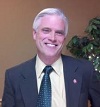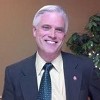
PART 2: Lee Martin elects entrepreneurial path, still at it 26 years later
 (EDITOR’S NOTE: This is the second of two articles from an interview with Lee Martin, one of the entrepreneurial leaders and champions in the East Tennessee region.)
(EDITOR’S NOTE: This is the second of two articles from an interview with Lee Martin, one of the entrepreneurial leaders and champions in the East Tennessee region.)
Some three months after his impactful conversation with his father, Lee Martin made his career path decision and founded a company called TeleRobotics.
“I never fancied myself as an entrepreneur,” he told teknovation.biz in a recent interview. Nevertheless, two companies and nearly 26 years later, Martin has devoted his career to entrepreneurship, literally impacting the lives of many as his father advised him to do.
His initial start-up – TeleRobotics International, Inc. – was based on Martin’s patents in robotics and image processing. The company changed its name to Omniview in 1994 and to iPIX two years later. Martin left the company in 1999, about the time iPIX went public.
The knowledge and experience that Martin gained during those 13 years have guided his work for the last 13 years.
“When iPIX went public, I had to figure-out a number of things,” he said, invoking the familiar Bible verse, “To whom much is given, much is expected.”
Martin elected to devote his first two post-iPIX years to helping launch the brand new Tennessee Technology Development Corporation (TTDC). “I wanted to use my experience with iPIX to inspire others,” he said.
TTDC was a creature of the administration of then Governor Don Sundquist. In his role as TTDC Executive Director, Martin travelled the state, extolling the importance of access to capital, entrepreneurs, and intellectual property and researchers. Ironically, those are still the key ingredients of TTDC’s focus today.
One of the ideas that Martin crafted at TTDC was something called the “Technopreneurial Program.” The concept was best characterized by Chuck Witkowski in a recent teknovation.biz article as “come for a degree, leave with a company.”
Martin launched the two-year evening school program at the University of Tennessee, Knoxville with a $50,000 grant from the Kaufmann Foundation. The funding allowed him to provide 12 student teams with $3,000 each to build their company.
“Bill Madia was a strong supporter of the program,” Martin said, referring to the first ORNL Director during the tenure of UT-Battelle, LLC as the lab’s managing contractor. “We had a challenge getting licenses executed. Madia stepped in, and our students executed seven technology licenses in days.”
The class started with 55 students, but about half of them dropped-out by the end of the second year. Martin cited Witkowski and Andrew Stephan as two of his most promising students and prolific grant writers.
Martin spent the next few years “writing a book on the theory of industrial engineering” titled Techonomics. Next up was a second start-up named Abunga, which positioned itself as an Internet retailer that allowed customers to block objectionable books from their accounts.
“It looked good on paper,” Martin said. “We were a family friendly online bookstore.”
The company operated in the virtual world, having less than a half-dozen employees while drawing on the distribution network of a Nashville-based publishing giant. The margins were challenging, Martin said, and the start-up encountered what he described as a “spiritual realm struggle” with those who thought “we might be censoring them.”
“Every time you do something in the real world, you have a chance to learn,” Martin says about the 2009 shutdown of Abunga.
Martin is now back in the classroom as a faculty member in UT Knoxville’s College of Engineering, ironically one of three career paths he explored in 1986. In his words, “Being a vicarious entrepreneur is the safer thing.” It is clear, however, that Martin’s passion for entrepreneurship has not waned nor has the advice that his father gave him 26 years ago.
“I’m helping plant seeds and seeing them germinate through others,” he says. “There are asier roads to travel, but not easier ways to affect thousands of people.”
Lee Martin clearly was impacted by his father’s answers to those questions he asked in that hospital room.
Like what you've read?
Forward to a friend!

